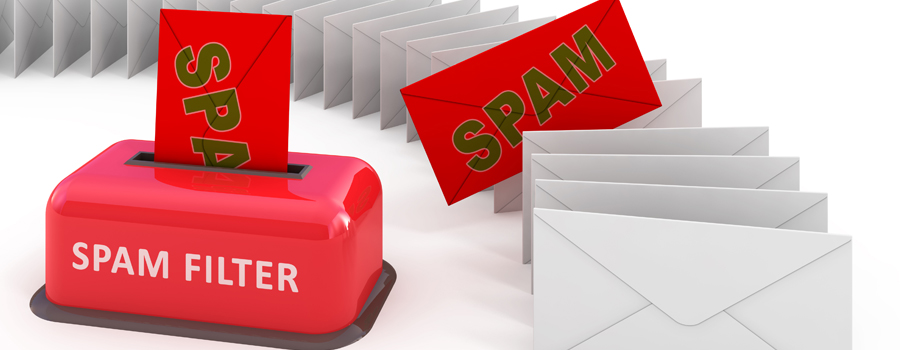
How much money are you wasting every year on email marketing due to the fact that your emails are getting caught in spam filters? If this is happening to you, gaining a better understanding of what spam filters are and how they can be avoided could help improve your ROI. We will walk you through the basics of spam filters and offer 5 tips for avoiding them in future email campaigns.
Understanding Spam
According to Spam Laws, spam makes up 45% of all emails. We’re all familiar with those sales-y emails, filled with bright colors, large letters, and too-good-to-be-true offers. However, we often don’t realize that the completely legal and well-meaning email campaigns we send to our list of legitimate subscribers can be perceived as spam as well. Spam is defined by MailChimp as “unsolicited, irrelevant email, sent in bulk to a list of people”. While we may not find our own content unsolicited or irrelevant, many spam filters do. And it isn’t that our content is blatantly spammy, but rather that these spam filters are being overly cautious, looking for certain triggers.
What are Spam Filters?
These spam filters that I keep referring to weigh a large number of factors when determining if an email is spammy or not. The spam filters are there to protect the recipient and oblige to Spam Laws, like the CAN-SPAM Act of 2003. The exact criteria they use to determine the “spam score” is unknown, but there are some common mistakes you can avoid when creating your next email campaign.
5 Ways to Avoid Spam Filters
1. Use Fewer Exclamation Points
First and foremost, an excessive amount of exclamation points in either the content or the subject line is just poor grammar. We get that you want to sound excited about what you’re sharing, but there are other ways to do so. So, next time you feel the urge to write “What an amazing offer!!!!” limit yourself to one exclamation point and create quality content that explains why the offer is so amazing.
2. Avoid Using All Caps
HITTING THE CAPS LOCK BUTTON IS A GREAT WAY TO GET CAUGHT IN A SPAM FILTER. And if you are lucky enough to avoid the spam filter, your recipients are sure to delete your email without a second thought. All caps sentences are difficult to read and give the illusion that you are being yelled at. Again, as excited as you are, find other ways to share your enthusiasm.
3. Don't Send HTML Emails with One Big Image
According to MailChimp, sending HTML emails that feature one big image and little to not text is a huge no-no. Spam filters cannot actually read images, “so they assume you’re a spammer trying to trick them”. While images and other visual content are great for emails, there should be a good balance between imagery and content if you want to avoid spam filters.
4. Avoid Spammy Phrases like “Click Here”, “Free” or “Buy Now”
Certain phrases are commonly identified by spam filters as “spammy” because they have been used in the past by spammers. Such phrases include “click here” and “free”. When possible, avoid using these phrases, especially in the subject line. Even if emails with these phrases make it through to a user’s inbox, there is still a good chance the recipient will find it spammy and delete the email before opening it. Instead, keep your subject lines focused on what’s in it for the user.
5. Don't Use “Bad” Content
Email expert, Laura Atkins, explores the concept of “content based filtering”. Atkins explains that spam filters don’t just focus on words; they can look at context as well. Spam filters are able to evaluate the HTML in the message, look for malicious content, investigate the domains and authentication of the sender, and keep an eye out for industries with bad reputations (i.e. Payday loans). Here are some more tips for avoiding bad content.
Avoiding spam filters can be frustrating when you find yourself jumping through hoops and manipulating content. Our recommendation is to keep things real and develop emails that you as a consumer would like to receive. If you need assistance creating or managing an email campaign, contact Informatics. We would be happy to help!
Sources: MailChimp; Spam Laws; Word to the Wise
